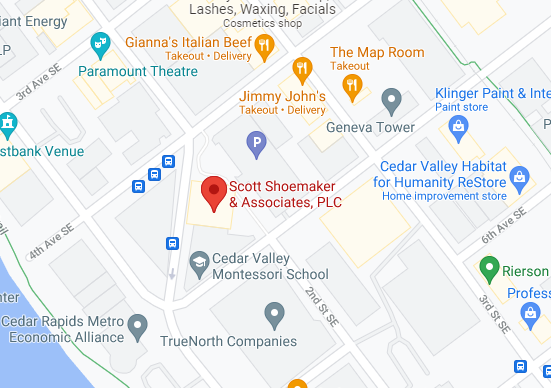Going through a formal probate court proceeding is not a particularly enjoyable experience. For many, it feels like salt being rubbed on the wound that’s left behind when a loved one passes away. Nobody particularly feels like dealing with the legal system following the passing of a loved one.
But do you know what’s even worse than going through a formal probate court proceeding? Going through two because you need to deal with domiciliary probate (in-state) and ancillary probate (out-of-state), as happens when the deceased owned property in more than one state.
To understand the difference between these processes we will first look at how the probate process in Iowa proceeds. Following this, we’ll turn our attention towards the ancillary probate process. Finally, we’ll close out by looking at how somebody could avoid ancillary probate in a few different ways.
What Is the Probate Process in Iowa?
First, let’s answer what probate is. Generally speaking, probate is the official process through which an estate is settled. This occurs under the supervision of the court. So when a person passes away without leaving an established will, an executor is appointed. It is their job to gather any owned assets and to value them, to settle any debts that were left remaining, and to distribute the remaining assets to the deceased’s heirs.
The idea here is that fraud and theft following death will be reduced or eliminated by going through the probate process.
In Iowa, probate is necessary if the following conditions are met:
- The estate’s value exceeds the small estate’s threshold
- There is no will
- There is a will but there is no living trust
It’s also important to note that Iowa requires an attorney to work on a probate case.
The probate process in Iowa is as follows:
- The deceased’s will, if they have one, is filed in the District Court in the county of their residence.
- A petition for probate is filed in order to request an executor appointment. If there is no will to appoint an executor then the court appoints somebody and gives notice of said appointment to all the beneficiaries.
- A notice announcing the Petition for Probate is published in the newspaper. This is to notify creditors, who will then have four months in which they can make a claim against the estate.
- Letters Testamentary are issued to the executor, which grants them the legal authority to act for the estate.
- The executor creates an inventory of all the assets of the estate and files it with the court.
- Once all the debts are settled, a petition is filed to close the probate process.
- Finally, the remaining assets are distributed to the beneficiaries.
What Is Ancillary Probate?
Sometimes it is necessary to conduct two different probate court proceedings, each in a different state from the other. Let’s use an example to see why.
Max is a widowed husband. He and his wife lived in Iowa their entire lives but they decided they wanted to purchase a vacation home. It took them years to decide on a location but they finally settle on Florida for its lovely weather. Max became the sole owner of the property, both in Iowa and in Florida, when his wife passed. When Max finally passes, the property should pass to his children. But in order to do so, probate proceedings must occur in Iowa and in Florida.
Unfortunately, this has the negative side-effect of leaving Max’s children with more legal issues to deal with while they’re trying to mourn the passing of their father. Iowa has no legal jurisdiction over a piece of property in Florida, so it will be up to Max’s children to either travel to Florida to deal with the issue or, what is more likely is, they will have to hire an attorney that can handle the Florida side of things for them.
As you can probably guess, there are a number of drawbacks to ancillary probate.
How Can I Avoid Ancillary Probate?
Drawbacks to ancillary probate include the additional cost of having to administer a second (or third) probate estate, the cost of additional court fees, accounting fees, and attorneys’ fees. While the process is often abbreviated somewhat by the courts in either state cooperation with each other, it is still possible to drain the financial reserves of an estate in this manner.
If the deceased passed away without leaving a valid last will and testament then the intestacy laws to determine who receives the property when there is no will can make matters complicated. Each state has slightly different laws surrounding this issue and it is an area that commonly presents major complications to the whole process.
One way to get around this headache is to make choices regarding your estate while you are still alive, choices that will help your loved ones to avoid having to deal with ancillary probate. Below are some options for avoiding ancillary probate, but picking the best possible option is a matter that will require more specifics about your case than we can give here. Reach out to Scott Shoemaker & Associates for more information on picking the option that is best for you.
Ways to avoid ancillary probate include:
- Recording a transfer-on-death deed for the out-of-state property
- Transferring the property into a revocable living trust
- Owning the property with somebody in joint tenancy
- Owning the property as tenancy by the entirety
- Owning the property as a community property with right of survivorship
Where Can I Get Help With the Probate Process?
If you are going to be facing the probate process then you cannot do it alone. You need to work with an attorney through this process and so it’s important that you work with an attorney that you can trust. Attorneys like those you’ll find at Scott Shoemaker & Associates.
We understand that this process is likely something you have no desire to do. It’s your time for mourning and we respect that. By working with Scott Shoemaker & Associates you are giving yourself more room to take that time you need to mourn. We’ll deal with the legal side of things, answer any questions you may have, and ensure that the process is as painless as possible so you can focus on what matters most to you.





